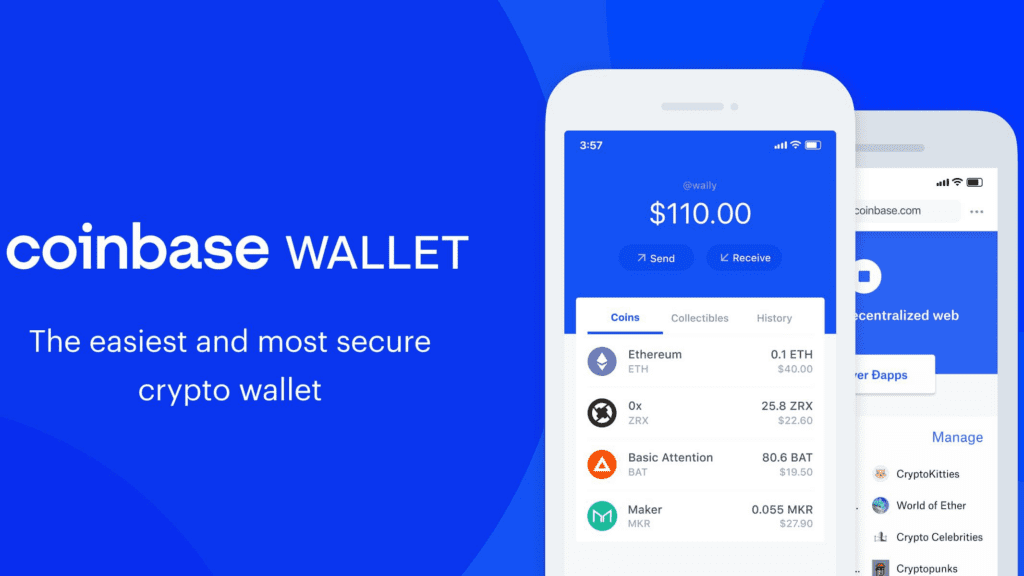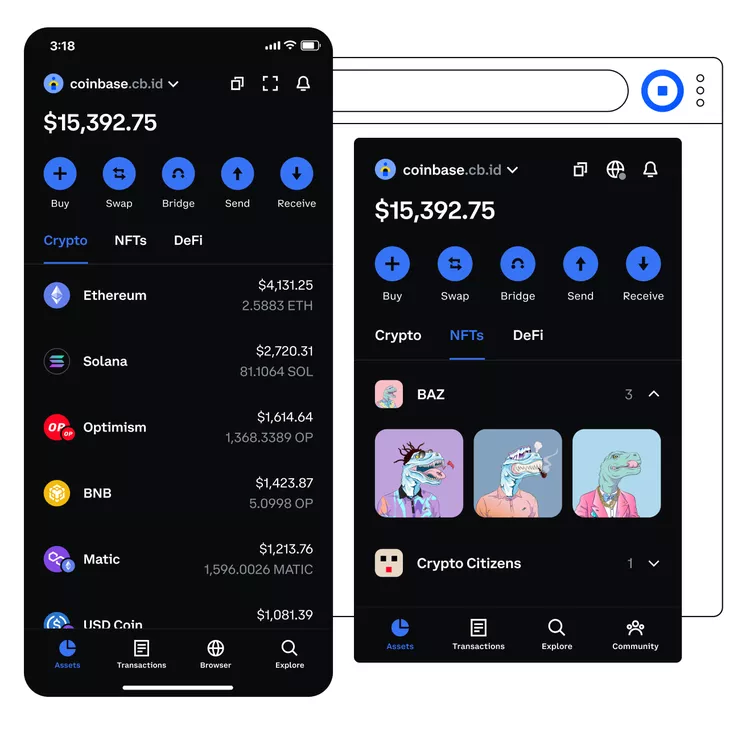Choosing a reputable wallet to store crypto assets is extremely important when participating in cryptocurrency. Besides security, Coinbase Wallet review is also an excellent choice for beginners, and here is the reason.
Cryptocurrency wallets are essential for buying, trading, and selling cryptocurrencies. Traders need them to store cryptocurrencies securely, as well as to protect and validate transaction information. Be it hardware or software, also known as hot and cold crypto storage, custom crypto wallets offer traders specialized solutions compared to those from exchange’s electronic currency translation.
Specifically, the following article will share with you about Coinbase Wallet and how it works.
What is Coinbase Wallet?

For those who are just getting started with cryptocurrency, Coinbase Wallet is fantastic. The user interface is clear and simple to use, with a straightforward three-tab layout and distinguishable features. The software links to the majority of major bank accounts.
One of the biggest wallets on the list, Coinbase Wallet supports more than 5,500 digital assets, including major coins like Bitcoin, Litecoin, Dogecoin, and Ripple as well as all ERC-20 tokens and tokens on EVM-compatible blockchains.
It is essential to distinguish between the Coinbase exchange and the Coinbase wallet. Coinbase exchange is one of the oldest and most famous cryptocurrency trading platforms in the United States. Keeping your digital assets on an exchange’s web wallet makes trading easier but leaves your funds more vulnerable to dangerous cybersecurity threats.
Coinbase Wallet is a hot wallet that can be used without opening an account with the exchange, and it is non-custodial, meaning the private key is stored in your device – not in Coinbase’s servers. This means you don’t need to worry about your currency getting locked for any reason or getting hacked on the website.
How it works
Coinbase Wallet uses BIP39, the industry standard, to generate a 12-word recovery phrase. This recovery phrase is the key to your wallet. Anyone with the recovery phrase can recreate your purse and take control of your crypto assets, so you should store it carefully.
In the background, a 12-word phrase associated with a private key (a long string of letters and numbers) allows you to control your wallet assets on the blockchain.
The wallet also uses the public key to generate the wallet address. Coinbase Wallet supports multiple networks (on mobile) and multiple accounts so that you can have multiple addresses.
All your Coinbase Wallet assets share the exact 12-word recovery phrase.
Coinbase Wallet is a hot wallet, meaning that the keys of the wallet are generated and stored on a device connected to the internet. You can connect your Ledger hardware wallet (cold wallet that generates offline private keys) to your Coinbase Wallet to further secure your assets. However, it would be best to do this with the new Coinbase Wallet using the Chrome extension.
When you send cryptocurrency or connect to a decentralized application, your wallet will ask permission to “sign” the transaction with your private key. Put, your wallet acts as a validator.
Pros and Cons
| Pros | Cons |
| Design intuitive interfaces on browser extensions and apps Supports thousands of dApps Easy-to-use NFT and Cryptocurrency Storage Compatible with other BIP39 wallets Link to Coinbase account or use standalone Free ENS-compatible wallet name | Ether fees can be high Bitcoins cannot be stored directly Internet connection hot wallet Relatively high fees |
Who is Coinbase Wallet suitable for?
- Current Coinbase exchange users. If you already use Coinbase to trade and need a wallet to store your tokens, then Coinbase Wallet is an ideal solution, as it integrates seamlessly with the trading platform. You can also cut transaction fees by transferring money between Coinbase Wallet and Coinbase accounts compared to other wallet apps.
- People with diversified crypto portfolios. The Coinbase wallet supports thousands of tokens, from popular ones like Ethereum and Solana to less popular ones like Zora. Coinbase Wallet can be a solid place to store your tokens if you have a crypto portfolio spread across different assets.
- People who want to be in control of their assets. Coinbase Wallet is a self-managed wallet, so users retain control of their tokens and keys. No third party can forge money without your permission.
- NFT trader. Coinbase Wallet makes buying non-fungible tokens (NFTs) easy with your debit or credit card.
Services offered

Crypto asset storage
Coinbase’s mobile wallet does a good job of sending and receiving. The wallet can support nearly all digital assets on the market, discover decentralized applications and manage their Polygon-based Ethereum and NFT.
Buy and sell crypto assets
Through the app’s decentralized exchange feature, users may immediately trade assets based on Ethereum and Polygon. The in-app cryptocurrency buying feature enables the purchase of non-Ethereum and Polygon assets. Users of Coinbase Wallet can also stake their cryptocurrency holdings to earn interest on them.
The payment methods you use on the Coinbase exchange are connected to the buying feature in Coinbase Wallet. In order to connect to your bank, Coinbase uses Plaid.

Swap
The swap experience (exchanging one token for another) works the same as it does on a Chrome extension. There is no adjustment to slippage, but the swaps execute smoothly.
Bridge
Coinbase Bridge allows you to move cryptocurrencies across blockchains. Transactions take a few minutes.
Ledger Support
One downside to using Ledger with Coinbase Wallet is that you have to start with a new Coinbase Wallet. With MetaMask you can connect to an existing wallet (but Ledger adds a new account).
Fee
Downloading and storing your digital assets on Coinbase Wallet is free. However, transactions such as depositing or withdrawing from wallets to external wallets are not free. The purchase, sale or exchange of coins incurs additional fees. You also have to pay a spread for each crypto buy/sell order.
There are no fees for transactions made between two Coinbase wallets. For other wallets, you will only pay the network fee, which varies depending on the token and network demand at that particular time.
If you connect your Coinbase Wallet to your Coinbase account to trade, you will be charged a fee of 0.5% to 4.5% for transactions depending on the token, volume, and payment method. maths.
You will pay a flat fee of 1% if you want to exchange one token for another in your Coinbase wallet.
Compared to other wallets, Coinbase fees are relatively high. However, users can choose to customize how much they pay for network (miner) fees, depending on how long they are willing to wait for their transaction to be processed.
How to set up a Coinbase wallet
I set up a new wallet using the Coinbase Wallet Chrome extension. Here’s a step-by-step guide.
Step 1: Download and install the Coinbase Wallet extension.
Visit Coinbase for the official download link. The link takes you to the Chrome extension installation page. Add the extension to your Chrome or Chromium-based browser.

Step 2: Create a new wallet.
Click on create new wallet. You can use the second option to install your wallet on additional devices later if needed.

Step 3: Write down your recovery phrase.
Your wallet will generate a 12-word recovery phrase as well as a hidden private key. Write down the recovery phrase and store it safely. Although Coinbase Wallet offers the option to copy the seed phrase to your clipboard, for security reasons, this isn’t recommended.

Step 4: Verify your recovery phrase and choose a password.
Choose the first and last word from your recovery phrase. On the next screen, you’ll also choose a password to protect your wallet while away from your computer.

Step 5: Claim your username.
Coinbase Wallet offers a free Ethereum Name Service (ENS) username using this format: yourname.cb.id. Others can send supported crypto tokens directly to your username, which maps to your wallet address. You can also import a .eth name if you have one.

That’s it. Click on the Buy button to connect to your Coinbase Pay account if needed.
Privacy and Anonymity
Because the Coinbase Wallet is entirely self-custodial, the user is in charge of ensuring the security of their assets. As no personal information, including an email address or phone number, is required to utilize the Coinbase Wallet, the wallet also has a high level of anonymity. You can choose whether or not you want your username and profile to be searchable in terms of usernames.
Conclusion
This pocket wallet is ideal for those who are new to e-wallets with its simple interface or anyone who prioritizes security and enjoys exploring the Web3. Traders who prefer to switch between simple and pro mode will also find Coinbase useful.
Coinbase Wallet offers several advantages over its main competitor, MetaMask, by providing support for Bitcoin, Litecoin, and several other cryptocurrencies. However, these additional cryptocurrencies are only accessible through mobile wallets, which feels a bit clunky at times. Another minus point is that its transaction fees are a bit high compared to other wallets on the market.
Coinbase’s seed phrase system ensures maximum security. However, this seed phrase must be kept safe. Coinbase allows you to automatically backup your seed phrase to Google Drive, which is very useful for users who may forget about it.
For basic sending and receiving as well as trouble-free swaps, Coinbase’s mobile wallet is a solid choice, while the Chrome extension provides a reliable way to discover web3 on the desktop.
DISCLAIMER: The Information on this website is provided as general market commentary and does not constitute investment advice. We encourage you to do your own research before investing.
Join us to keep track of news: https://linktr.ee/coincu
Foxy
Coincu News






















